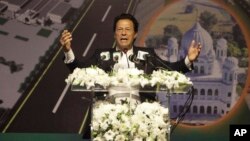Pakistan’s Prime Minister Imran Khan renewed Wednesday his resolve to cooperate with the United States to achieve a political settlement with the Taliban to end the war in Afghanistan, now in its 18th year.
Khan made the remarks during a meeting with the visiting U.S. special representative for Afghan peace and reconciliation, Zalmay Khalilzad.
“The prime minister reiterated Pakistan’s abiding interest in achieving peace and reconciliation in Afghanistan through political settlement,” Khan’s office said in a statement issued after the meeting.
Khalilzad arrived in Islamabad on Tuesday and held delegation level talks with senior foreign ministry officials before paying the courtesy call on Prime Minister Khan, officials said.
The U.S. envoy’s visit followed President Donald Trump’s formal request for Khan’s help in finding a political solution to the Afghan conflict.
“U.S. leadership looked forward to working with Pakistan in furthering the shared goal of peace through a political settlement in Afghanistan,” the Pakistani statement quoted Khalilzad as saying.
The Trump administration has tasked the Afghan-born former U.S. ambassador to Kabul to persuade the Taliban to join an Afghan peace process for ending the protracted war.
U.S. and Afghan officials have long accused Pakistan of sheltering Taliban leaders and allowing them to orchestrate attacks inside Afghanistan. Islamabad rejects the charges.
Khalilzad is on an 18-day trip to region, his third since taking office, and plans to visit Afghanistan, Uzbekistan, Turkmenistan, Russia, UAE and Qatar, where the Taliban maintains its so-called political office.
During his previous two trips to the region, Khalilzad also traveled to Qatar and held marathon meetings with Taliban representatives there. He has held talks with Afghan politicians inside and outside of the government in Kabul.
Taliban officials insist that in talks with the U.S. they are seeking the withdrawal of all U.S. and NATO forces from the country before agreeing to join an intra-Afghan peace dialogue.
In a statement issued Tuesday, insurgent spokesman Zabihullah Mujahid said they “will not tolerate foreign occupying and military presence under any circumstance.”
Mujahid also dismissed reports that Khalilzad is discussing with the Taliban possible future political dispensation in Kabul and other related issues.
“The formation of a government, establishing security and developing Afghanistan is a matter concerning the Afghans. No foreign occupying force has any legal right for determine the fate of Afghanistan, interfere in its matters or make comments as a proprietor,” said the Taliban spokesman.
Khalilzad has shared few details of his talks with the Taliban, though he said last month he was “cautiously optimistic” about achieving a peace deal.
Pakistan’s relations with the U.S. have dipped to historic lows in recent years over allegations of supporting the Taliban and other militants in the region. President Trump’s letter to Khan on Monday was a rare positive development in the fragile bilateral ties.
Lieutenant General Kenneth McKenzie, chosen to be the next commander of U.S. Central Command told Senators on Tuesday that Pakistan’s assistance is key to finding any solution in Afghanistan.
“It is in Pakistan’s long-term interest to have a government in Afghanistan that is stable that they can do business with. It will be hard to reach a settlement without some form of assistance from Pakistan,” McKenzie said during a Senate Armed Services Committee hearing.
Islamabad has long urged in talks with the U.S. that rival India’s growing influence in Afghanistan was a matter of concern for Pakistan. Pakistani security officials blame Indian intelligence operatives for supporting anti-state militants planning terrorist attacks in Pakistan from Afghan soil, charges both Kabul and New Delhi reject.
“I believe Pakistan knows very clearly that their assistance will be required to reach an end state in Afghanistan. I think the chance that we have is to make it attractive to them so that they see that it is in their best interest to do that,” noted the U.S. commander.
Khan said Monday that Trump wants Pakistan to use its influence to nudge the Taliban to participate in Afghan peace talks.






